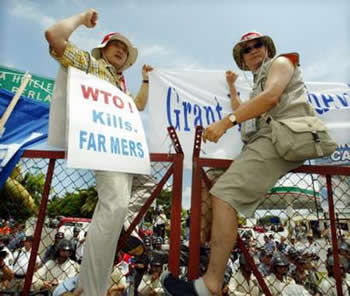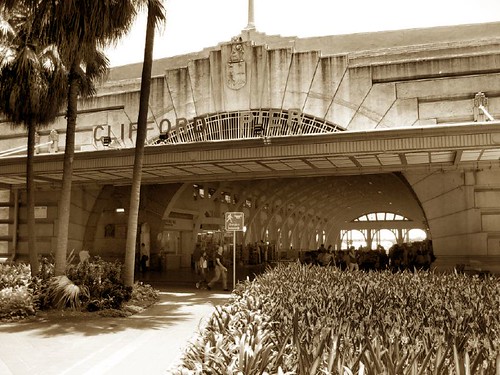Honestly, I was shocked.
And I was wondering how come we never see any protests like in Hong Kong when there are big IMF / WTO and the likes having their meetings here. So this is how....
But then as I read on the article and it quoted Wong Kan Seng saying that there are no "illegal gathering of more than 4 person" ... haha i just wanted to laugh my ass out loud because in Singapore we are so so so used to that! Remember the NKF-CPF Silent protest? It's just classic. 
Overseas protestor needs to learn a thing or two from these 4 brave folks. this is the trend to all future protests in Singapore
Oh well those poor civil groups, i know they're make a big hoohaa about how there are no rights in singapore yada yada yada but you know i guess... i'm sort of glad. maybe because im a chicken bred by singapore but then its gonna be so chaotic if there were ritual suicides like the korean farmer (left; below photo) in Cancun Mexico. No need for such drama here my friends. 
Caption: Korean farmer Lee Kyung-hae (L) shouts slogans as he sits atop a barricade, blocking access to the road to Cancun's hotel strip, which is hosting a World Trade Organization ministerial meeting, September 10, 2003. Lee later stabbed himself in the chest shortly afterwards and died of his wounds in hospital. A friend said his suicide was an 'act of sacrifice' to show his disgust at the WTO and its policies. REUTERS/Daniel Aguilar
The protesters in HK were only just recently released. One thing though, I actually know people in SB that goes all over the world to protest the WTO like Katie... *cough* lol but it's interesting to read this article and try to put ourselves in their shoes. I must say I do very very much support their cause but then I guess since being so used to the singapore laws, I'm not as outraged as they are about this. Think of that bear who campaigned for anti-fur causes during the the queen of england's visit to Singapore. At least she was creative.
The bear in question, literally.
------------------------------
Activists Concerned over Singapore's "Caning" Threat
by Emad Mekay
WASHINGTON, Feb 28 (IPS) - Concern is brewing among advocacy groups and civil society organisations that monitor the International Monetary Fund (IMF) and the World Bank, a staple of protests during the annual meetings of the two organisations, after Singapore threatened a crackdown on some of their activities.
A number of international civil society groups are drafting a letter to the government of Singapore to dissuade the country from vows that its chief security official made against their activities.
Singapore's Home Affairs Minister Wong Kan Seng had reportedly said that certain civil society actions may "attract severe punishment, including caning and imprisonment" in this southeast Asian country where a political gathering of more than four people requires a security permit.
Activists interpreted this as a more or less veiled threat towards civil society organisations and wrote a letter to be sent to Prime Minister Lee Hsien Loong, possibly later this week, asking him to roll back the warning and allow full access to the groups during the Sept. 19-20 meetings.
"Many groups are concerned about these threats and intimidations, but are determined not to let such threats undermine actions being planned," said Rukshan Fernando of the Bangkok-based Asian Forum for Human Rights and Development (FORUM-ASIA) in an email message to IPS.
The 184-member IMF and the World Bank will hold their annual meeting amid what is expected to be highly tight security in the wealthy city-state, where public demonstrations are banned and the last police licence for a demonstration in Singapore was issued in the late 1980s.
The annual meetings, held outside of Washington D.C. once every three years, are the largest and most comprehensive gathering of global financial representatives in the world. They are expected to draw about 16,000 visitors this year.
Organisers in Singapore, a country of 4.5 million people, expect some 300 to 500 non-governmental organisations to be accredited by the IMF and World Bank for the meeting.
Meetings for international financial and trade institutions, which often discuss the course of global economic development and plan the underpinning policy strategies, have attracted heated activities from advocacy groups along with street protests, some of them marred by violence.
Around 30,000 demonstrators turned up for the 1999 World Trade Organisation (WTO) talks in Seattle in the United States, and more than 20,000 protested against the Bank and Fund in Washington the following year. However, fewer numbers have protested since the Sept. 11, 2001 attacks in the United States.
Some critics have pointed out that these institutions have been holding their meetings in tightly controlled countries, including the last IMF/World Bank meeting outside Washington, held in Dubai. In 2001, the WTO organised its ministerial conference in Doha, the capital of Qatar, ruled by an authoritarian regime with close military ties to the United States.
Singapore, however, where people are penalised for failing to flush a public lavatory, for instance, had to accept a request by the IMF and World Bank to allow demonstrations during the meeting in order to be able to host the gathering, which usually attracts finance, trade ministers and central bank governors from around the globe.
But activists say that if implemented, the threats from Singapore to place restrictions on the activities of civil society groups could in fact impede their engagement during the meetings on strategic issues such as trade, aid, debt and sustainable development.
"Thus, we would like to highlight the importance of spontaneous and unrestricted civil society actions before, during and after the WB-IMF meeting," the groups said in their draft letter to the Singapore government.
Dozens of organisations have endorsed the letter so far. These include Focus on the Global South, the Halifax Initiative Coalition in Canada, the Think Centre, and Jubilee South.
Singapore says that the IMF and World Bank have an 'established process' to engage these civil society groups, including having them take part in activities throughout the annual meetings.
The groups said they expect that even the regulated processes, agreed upon by the IMF and the World Bank with the government of Singapore, will likely follow previous patterns where participation has been selective and exclusive, and has provided limited opportunities for the expression of civil society voices.
But a spokesperson for the IMF told IPS that the security issue for the meeting is under discussion with the government of Singapore and said his institution will press for the full participation of civil society groups.
"The bottom line is that we want to have an inclusive meeting, with active and open NGO participation. That's the whole plan," said William Murray of the IMF. "I am not aware of any desire by anybody to cane anybody. This is a hypothetical situation and frankly security is an issue of ongoing discussions."
Civil society groups have long criticised the IMF and the World Bank, both dominated by industrialised nations, for placing the interests of international corporations, the rich and local elites before the middle classes and the poor around the world.
Another point of alarm for civil society groups were statements by the government that it would only allow peaceful protests by foreign organisations - waiving the rules that normally apply in Singapore û and that local groups will not be able to participate
The activists said that peaceful protests are universal rights that should be extended "to all people, including Singaporean people and organisations."
Earlier in January, the Consumers Association of Penang and Friends of the Earth Malaysia called for a boycott of Singapore Airlines, the national carrier, to protest the warning issued by the Singapore government that it is prepared to "cane" or imprison protesters.
"Imposing restrictions on demonstrations by civil society to express their outrage at the brutal policies of the IMF and World Bank that impoverish societies and destroy the environment, is indeed a restriction on the freedom of expression and the right to dissent against unjust policies", said Mohd Idris, who heads the two groups.
Activists fear that Singapore's vow to place restrictions on civil society groups is likely to be translated into unwarranted screening of participants in the events and anyone who enters Singapore during that period.
The Singapore government has been keen to use the opportunity to promote tourism and showcase the country as a leading financial centre.
During the last annual meetings in Washington, it set up a colourful booth to advertise its housing in 2006. It has already launched a website in anticipation of the event that touts the country's glittering skyscrapers and thriving port. Singapore says it has also prepared a visual arts extravaganza that will take place for the first time in Southeast Asia. (END/2006)
Source: TargetWTO
Read full article here






 vs
vs 




 I can be contacted at
I can be contacted at 






